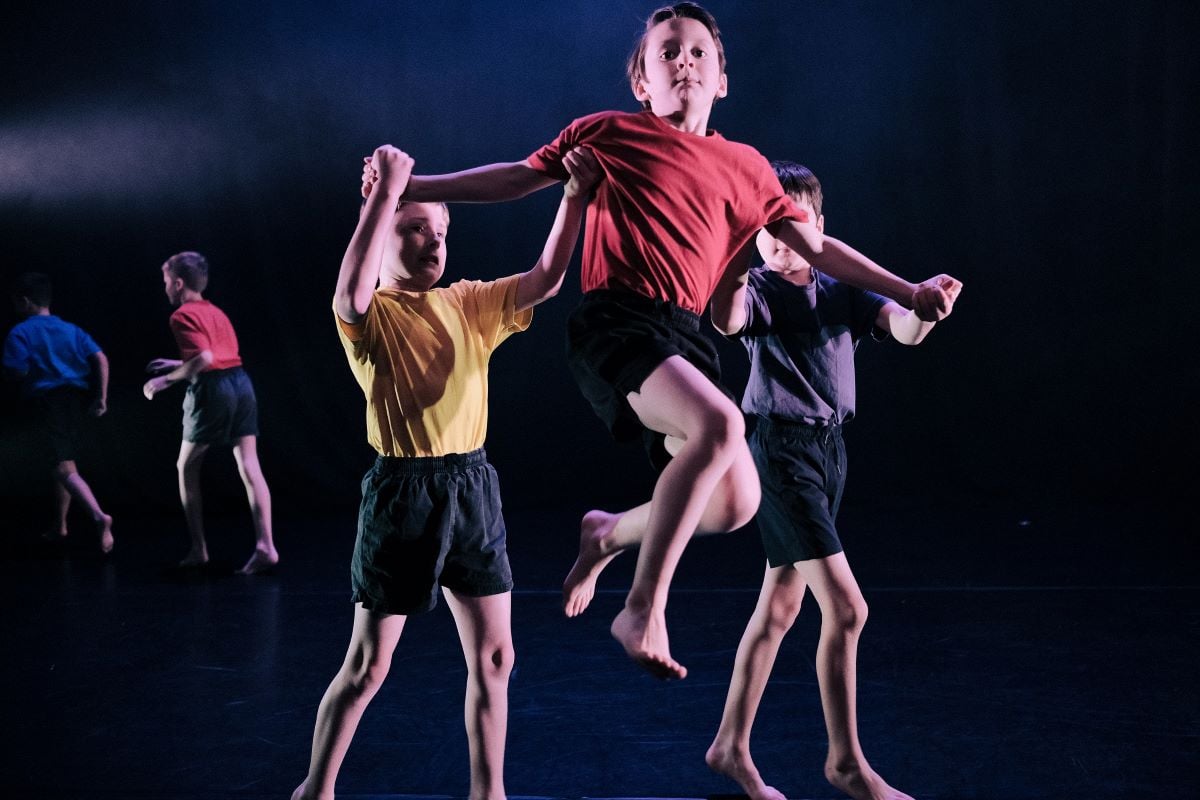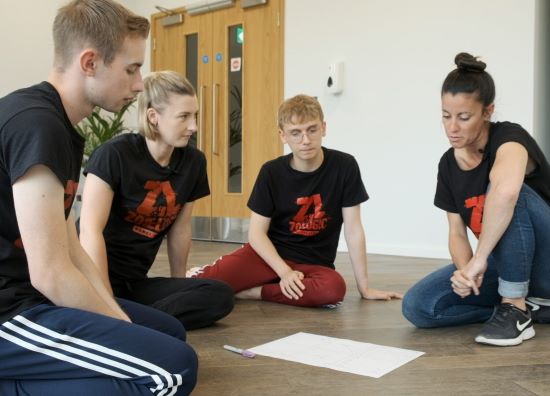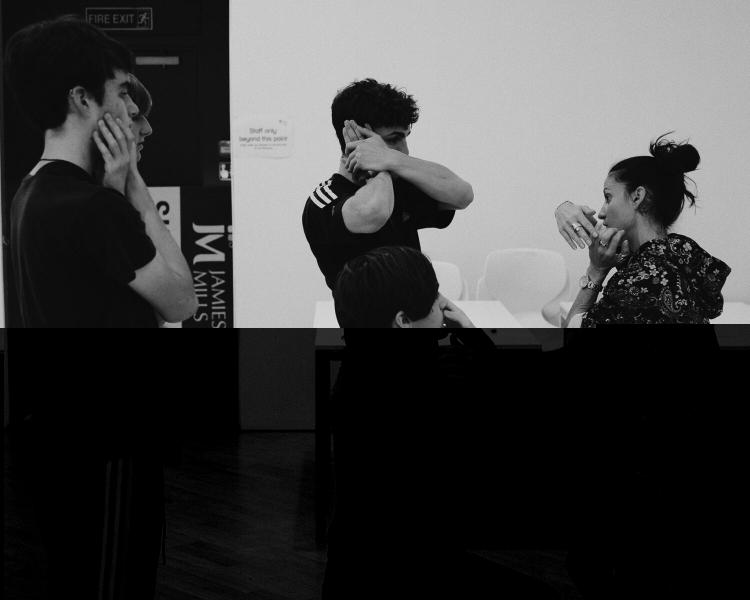
ManMade, ZoieLogic Dance Theatre 2019
How do you get into dance?
Zoie Golding and Ollie Webb are 20 years apart in age and experience. Coming from backgrounds where a career in dance would be unlikely, they have taken unconventional routes into the industry, as Rowena Price discovered.
As we head into the 2023-24 school year in an increasingly challenging environment – socially, politically and academically – dance education provision in schools is rapidly diminishing. There are scant resources for picking up the slack in the community and, for professionals across the industry, there’s concern we're careering towards a point of no return.
Uptake of creative subjects has been sliding and dance courses further along the education chain are disappearing. “We’ve gone backwards”, says Zoie Golding, Artistic Director of ZoieLogic Dance Theatre.
“It’s the very beginning of access to dance that I’m most worried about. If we take privilege and private education out of the equation, it’s state education settings that make options for career paths visible.”
Blurring boundaries
For young people, there’s a world of possibility online. Dancetok, for example, broadens horizons and blurs boundaries between amateur and professional. But that’s no substitute for access to facilities and teachers in schools to hook and hone potential in an artform so essentially physical and relational.
“My secondary school was built with the intention of being given specialist performing arts status”, says Ollie Webb, Project Coordinator at ZoieLogic Dance Theatre. “Now, the dance studio and theatre is being used for kids in detention.”
While this may not be widespread, it paints a dispiriting picture. If the bottom falls out of the industry, who will be dancing, teaching, choreographing, producing, project managing in generations to come?
Connected community
Zoie founded FuzzyLogic, Southampton’s youth dance company for boys and young men in 2000, and then in 2011, ZoieLogic Dance Theatre. Both are known for challenging perceptions of what dance is and who it’s for.
But rewind to the late 1980s: nobody in Zoie’s family worked in the arts. Her way in was through the community and the tenacity of her mother.
“I was brought up in a single-parent family. My mum worked four jobs to enable me to try dance and follow my passion. Other parents would help with lifts, costumes and support – a real community effort that has driven my career.”
The latter years of her education in the 90s coincided with a New Labour government and increased investment in the arts. “We were lucky to have new facilities and a strong culture of arts in my school. My teacher played a huge role. She’s the reason I followed a career in dance.”
In short, a connected community of individuals, funding, facilities and performance opportunities, made things possible.
 Zoie (right) and Ollie (second right) planning in the ZoieLogic Dance Theatre studio.
Zoie (right) and Ollie (second right) planning in the ZoieLogic Dance Theatre studio.
Leap of faith
Fast forward to 2010: Ollie Webb (now aged 20 and an apprentice at ZoieLogic) had his first exposure to dance. That was the year the EBacc accountability measures were introduced in English schools.
“I started doing street dance when I was about seven. We were all off the estate, we were all working class. Culturally, street dance was the thing. I tried football – wasn’t interested.”
Growing up on a Southampton council estate, Ollie says that, like Zoie, a career in dance wasn’t something he thought possible. “I couldn’t see what my options were. I didn’t have a blueprint, none of my family had careers in the arts.”
At secondary school, he did occasional dance classes until Year 9/GCSE when he met Zoie. “She did a workshop for boys and spotted my potential.
The dawning idea that a career in dance might be possible was a leap of faith and imagination, facilitated by parents who went the extra mile to support him and access to funded dance with inspirational teachers in and outside of school. He ended up taking triple Musical Theatre and Dance at A Level.
Not an elite career
The dance industry is broad and diverse, made up of many styles and cultures, disciplines and techniques on stages, screens and beyond. A career in dance isn’t just about being an elite dancer, choreographer or teacher. There are many roles in and routes into the industry.
For Zoie, the route came by doing A-level Dance when she volunteered for and took part in the now defunct UK Rock Challenge. She became its lead producer by the time she was in her early twenties.
“Rock Challenge was funded through policing and health funds – not arts funds. I didn’t start working in dance knowing the industry could be funded the way it is now”, she says. “I was inspired to create more opportunities for boys to try dance, so I set up FuzzyLogic just after leaving college.”
Now she’s finding different ways to hustle, filling gaps where provision is waning. For example, leveraging private investment from businesses and individuals in the Southampton area to supplement the usual funding routes.
Education system doesn’t prepare you
“Money is always a challenge, but no more so than now. We need investment to ensure young people with potential don’t fall through the cracks. The youth dance sector is still doing great things – as are schoolteachers – in an increasingly challenging environment.”
But teacher training bursaries for dance have also disappeared, further devaluing and disincentivising uptake and careers in dance. For Ollie, an apprenticeship with ZoieLogic Dance Theatre in partnership with Artswork has been the way in.
It provided a bridge from a stalled dance degree at Falmouth Uni (he left the course during Covid) to a job in the dance world that he loves.
But he needed support to explore the options: “I didn’t understand what the routes were. Conversations about the many roles in the industry didn’t happen. The education system doesn’t prepare you.”
 FuzzyLogic, Headfunk 2021
FuzzyLogic, Headfunk 2021
What needs to change?
Zoie and Ollie’s career trajectories challenge perceptions about how to forge a career in the industry. A performing arts degree or vocational training isn’t the only way.
Volunteering and apprenticeships are good options but require funding and structural support to make them accessible and visible. Both Zoie and Ollie express urgency and concern for the future, as the trajectory of access continues in the wrong direction.
Visibility, advocacy and investment focused on grassroots education have to be the priority, says Zoie. “[Our company] is about reducing barriers. This devaluing of dance education is a barrier we haven’t faced before. How do we nurture talent if the pipeline doesn’t exist?
“We’re now taking on the responsibility to lever bigger funds for grassroots work from the private sector, as well as public funding and trusts, to invest in talent development.”
If you can see it, you can be it
Zoie stresses the need to shape opportunities for dance hopefuls that are broader in scope, diversify and demystify the industry, and show the range of jobs in dance that exist. Join the dots between private dance schools, mainstream and further education, dance companies: “If you can’t see it, you can’t be it.”
Ollie agrees: “DanceTok definitely touches on something – the reach and visibility of dance for and by anyone is important. We could use social media more to show what happens behind the scenes, explain the range of jobs, as well as continuing to go into schools.”
Solutions lie in increased visibility, advocating for the value of the artform and securing alternative investment, involving community, networks and the pooling of resources and expertise.
Everyone in the industry must double down on contributing – from elite dancers to conceptual game-changers, to behind-the-scenes enablers. If the dance world – built on skills and characteristics so inherently tenacious, energised and agile – can’t tackle this, who can?
Rowena Price is a freelance Communications Consultant and Coach.
Zoie Golding is Founder and Artistic Director of ZoieLogic Dance Theatre.
Ollie Webb is Projects Coordinator at ZoieLogic Dance Theatre.
![]() www.rowenaprice.com | www.zoielogic.co.uk
www.rowenaprice.com | www.zoielogic.co.uk
![]() Rowena Price | Zoie Golding
Rowena Price | Zoie Golding
Join the Discussion
You must be logged in to post a comment.